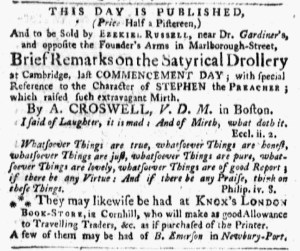What was advertised in a colonial American newspaper 250 years ago today?

“Will make as good Allowance to Travelling Traders, &c. as if purchased of the Printer.”
A portion of the commencement exercises at Harvard in 1771 generated such enthusiasm in some quarters and outrage in others that printer Ezekiel Russell decided to publish Andrew Croswell’s “Brief Remarks on the Satyrical Drollery at Cambridge, last COMMENCEMENT DAY; with special Reference to the Character of STEPHEN the PREACHER; which raised such extravagant Mirth.” (Read the British Museum’s copy.) For those who attended the event, this publication served as a counterbalance to the “vain laughter, and clapping” that “gave great offence” (at least to Croswell). For others who had not heard the “Satyrical Drollery” and witnessed “such extravagant Mirth,” the pamphlet gave them an opportunity to learn more about what had transpired, though through the lecturing tone of a critic who had not appreciated the behavior he saw exhibited at the commencement. For Russell, this represented an opportunity to generate revenues and increase foot traffic in his shop.
Yet Russell’s shop on Marlborough Street in Boston was not the only location where consumers could acquire copies of the pamphlet. An advertisement in the August 19, 1771, edition of the Boston Evening-Post advised that they “may likewise be had at KNOX’S LONDON BOOK-STORE, in Cornhill.” Henry Knox, the bookseller who later became a senior general in the Continental Army during the American Revolution and the new nation’s first Secretary of War, had recently placed his own advertisements in the city’s newspapers. In addition, residents of Newburyport and the surrounding towns could instead visit B. Emerson, who stocked a limited number of copies. The following day, and advertisement in the Essex Gazette advised readers in Salem that Samuel Hall also sold the pamphlet.
Russell also envisioned other means of distribution. In his advertisement, he indicated that Knox “will make as good Allowance to Travelling Traders, &c. as if purchased of the Printer.” In other words, itinerant peddlers as well as booksellers and shopkeepers received discounts for buying in volume for the purposes of retailing to their own customers. Knox offered them the same prices they would have otherwise received by purchasing directly from Russell. The printer and his associates worked together to incite demand by disseminating copies of the pamphlet and offering deals to retailers. The newspaper advertisement alerted prospective customers to three locations that carried the “Brief Remarks,” but also encouraged them to ask for it from “Travelling Traders” and others who might have also added it to their inventories.
